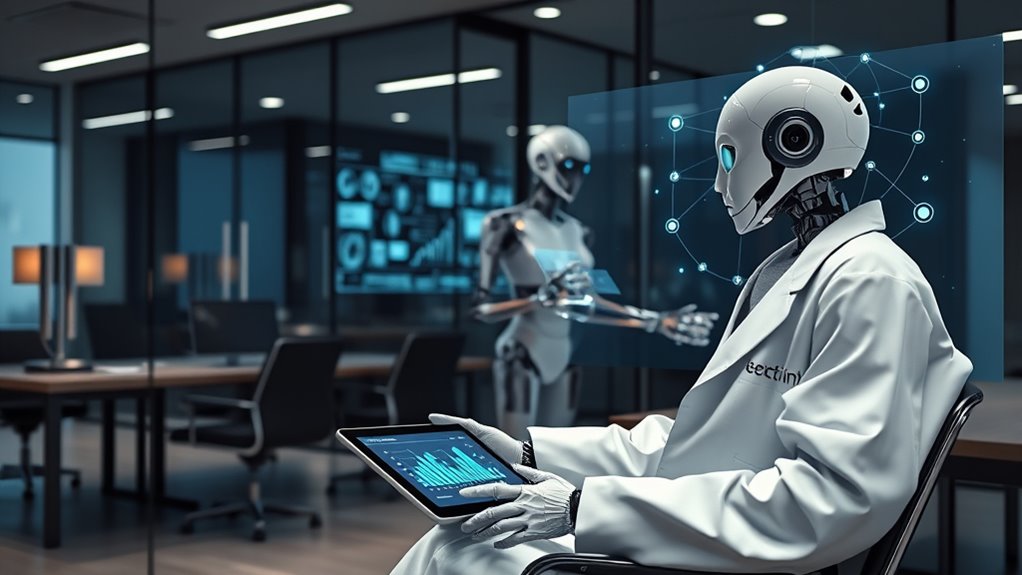AI and automation are rapidly transforming white-collar jobs like law and medicine, automating routine tasks and shrinking entry-level roles. Even specialized professionals find their work increasingly supported or replaced by intelligent systems, making job security uncertain. Salaries are plateauing, and opportunities for new entrants are limited. To stay ahead, you need to understand how these changes affect your career and explore strategies to adapt. Keep exploring to see how you can future-proof your skills.
Key Takeaways
- AI automates routine legal and medical tasks, reducing the need for entry-level roles and traditional job functions.
- Increasing adoption of AI tools in law and healthcare enhances efficiency but diminishes job security for unskilled workers.
- Automation enables rapid analysis and decision-making, challenging the relevance of human judgment in these fields.
- The decline in entry-level hiring and job postings signals a shrinking pipeline for new professionals in white-collar sectors.
- To remain relevant, lawyers and doctors must develop digital literacy, acquire AI certifications, and adapt to ongoing technological changes.
The Rise of AI in Traditionally Secure Professions

Have you noticed how AI is rapidly transforming historically secure professions like law and medicine? Adoption rates are soaring, with nearly triple the number of legal professionals using AI in 2024 compared to 2023. Larger law firms lead the charge, with 46% implementing AI tools, while solo practitioners lag at 18%. Despite cautious firm-wide adoption due to ethics and accuracy concerns, personal AI use among legal professionals rose to 31% in 2025. In medicine, AI adoption varies by specialty and resources but is steadily increasing. Overall, over half of legal professionals see AI as the most transformative technology in their field. This shift is accessing new productivity, freeing up hours, and shifting focus from routine tasks to strategic work, signaling a fundamental change in how these professions operate. AI automates routine tasks, allowing professionals to engage more in strategic planning and relationship building. Additionally, the importance of ethical considerations is becoming more prominent as AI integration expands. Moreover, understanding legal guidelines surrounding AI use is crucial for professionals to navigate the evolving landscape responsibly. Furthermore, the integration of AI into these fields is prompting discussions about professional ethics, emphasizing the need for clear standards and guidelines. As AI becomes more embedded, technological literacy will be essential for professionals to effectively utilize these tools and maintain trust with clients and patients. Staying informed about regulatory compliance will also be vital as legal frameworks adapt to technological advancements.
How Automation Is Redefining Legal and Medical Workflows

Automation is fundamentally reshaping legal and medical workflows by streamlining tasks that once required significant time and human effort. In legal work, over 2,800 professionals now use AI for drafting correspondence, analyzing data, and reviewing documents, drastically reducing review times and improving accuracy. AI-powered platforms can analyze complex contracts in minutes and predict case outcomes with predictive analytics, helping you develop better strategies. As routine tasks like document review and contract analysis become automated, you can focus on high-value activities such as client relationships and legal strategy. Meanwhile, in medicine, automation supports real-time clinical decisions, streamlines electronic health records, and accelerates research by analyzing large datasets. These changes increase efficiency, reduce errors, and make legal and medical services more accessible. Larger firms report a 39% adoption rate of generative AI, indicating a significant shift toward automation in the industry. Additionally, advancements in regulation of refrigerants illustrate how automation and innovation continue to transform various sectors, pushing industries toward greater efficiency and improved outcomes. The integration of artificial intelligence into these fields exemplifies how technology is driving this transformation at an unprecedented pace.
The Disappearance of Entry-Level Roles and Its Implications

As AI continues to streamline legal and medical workflows, its influence extends beyond these fields, considerably altering the broader job market. You’ll notice a sharp decline in entry-level roles, especially in tech, where hiring has dropped over 50% since 2019. Many industries are experiencing fewer job postings for new graduates, partly due to economic uncertainties and budget constraints. Although remote positions are rising, they still make up a small share of available jobs. AI’s automation capabilities threaten to replace tasks traditionally handled by entry-level workers, reducing opportunities and shifting salary expectations. This trend worsens talent pipeline issues and intensifies competition for the few remaining roles. Additionally, raw food diet principles could serve as a metaphor for fundamental skills and adapting to changing economic realities by focusing on fundamental, unprocessed skills and resources. Developing core competencies is essential for resilience in an evolving employment landscape. Recognizing these shifts, businesses and individuals must prioritize adaptability and reskilling to navigate the evolving employment landscape effectively, especially as the importance of natural environments and sustainable practices becomes more apparent in the current economic climate.
Shifting Salary Expectations and Professional Responsibilities

With economic conditions becoming more cautious, salary expectations for white-collar roles are expected to moderate in 2025. You’ll notice pay increases slowing, especially outside specialized fields. For IT professionals, salaries grew modestly in 2024 and will continue to rise steadily, driven by demand for skills in AI, cloud computing, and machine learning. Mid-level workers earn around $27.09 per hour, but wages vary considerably by location and industry. Factors influencing salary adjustments include:
- Conservative company policies amid economic uncertainty
- Increased automation reducing staffing needs
- Industry-specific impacts, especially in tech
- Higher pay for expertise in emerging technologies
- Focus on skill-based compensation over tenure
- Industry trends indicate ongoing shifts toward automation and digital transformation, influencing salary dynamics across sectors. Monitoring market conditions can help professionals better anticipate salary changes and career opportunities. Recognizing technological advancements is crucial for staying competitive in evolving job markets.
Adapting to these shifts requires reevaluating your professional responsibilities and continuously upgrading your skill set. Paying attention to Key Traits of Successful Software Quality Assurance Engineers can help professionals stand out in competitive markets and adapt to ongoing technological changes. Developing a comprehensive understanding of industry trends is essential for maintaining relevance in a rapidly evolving job landscape.
Preparing for a Future Where Human Expertise Is Supplemented or Replaced

Despite the high level of specialization required, lawyers and doctors are increasingly vulnerable to AI-driven automation. You need to prepare for a future where many routine tasks—legal research, contract drafting, diagnostics—are handled by AI tools. This shift means job displacement isn’t gradual; it’s accelerating, reducing entry-level opportunities and limiting career pathways. To stay relevant, you must focus on reskilling and continuous learning, embracing digital literacy and AI training. Professional associations and employers are pushing for certifications in AI tools, but resistance remains. You should also consider alternative credentials and mentorship to navigate the shrinking pipeline. Policymakers and institutions are updating curricula and regulations to support this evolution. According to recent employment data, nearly 40% of white-collar job seekers failed to secure interviews in 2024, highlighting how rapidly opportunities are diminishing. Preparing now helps you adapt to a future where human expertise is supplemented or replaced, ensuring your professional resilience. Furthermore, understanding the impact of automation on careers can help you identify areas where human judgment and emotional intelligence remain irreplaceable, especially in fields requiring emotional intelligence and nuanced decision-making.
Frequently Asked Questions
How Quickly Will AI Fully Replace Doctors and Lawyers?
You’re wondering when AI will fully replace doctors and lawyers. Right now, AI mainly supports professionals, handling routine tasks and improving efficiency. Technical and ethical challenges, like complex judgment and empathy, slow down full replacement. Experts believe AI will continue working alongside you, enhancing your skills rather than replacing you. So, full automation isn’t imminent; instead, expect a future where AI and professionals collaborate more closely.
What New Skills Do Professionals Need to Stay Relevant?
Think of staying relevant in your career as sailing against the tide—you need the right skills to keep you afloat. To do that, you must develop critical thinking, emotional intelligence, and digital literacy. Embrace continuous learning, hone your soft skills like communication and adaptability, and stay open to innovation. By doing so, you’ll navigate the changing landscape and turn challenges into opportunities, keeping your career resilient and future-proof.
Will Ai-Driven Automation Lead to Universal Basic Income?
You’re wondering if AI-driven automation will lead to universal basic income. As AI automates many jobs, especially repetitive tasks, more people might face job displacement. This could push society to contemplate UBI as a safety net, ensuring economic stability. While not guaranteed, the growing automation trend makes UBI a likely discussion point, aiming to support those affected and maintain social and economic balance.
How Will Legal and Medical Ethics Evolve With AI?
You wonder how legal and medical ethics will evolve with AI. As AI becomes more integrated, you’ll see a shift toward emphasizing human oversight, establishing clearer ethical boundaries, and developing robust guidelines. You’ll need to prioritize patient and client privacy, ensure informed consent, and uphold professional accountability. Ethical standards will adapt to balance technological benefits with safeguarding fundamental rights, making ongoing training and strict oversight vital in both fields.
What Industries Will Remain Unaffected by AI Automation?
You might wonder which industries stay safe from AI automation. Healthcare roles involving direct patient care, like nurses and mental health professionals, rely on empathy and complex judgment AI can’t replicate. Creative fields such as artists and writers depend on originality and emotional depth. Skilled trades like electricians and plumbers require hands-on expertise and adaptability. Jobs demanding social intelligence and nuanced interpersonal skills, like teachers and social workers, also remain largely human-driven.
Conclusion
So, here’s the irony: as AI takes over tasks once thought uniquely human, you might find yourself more replaceable than ever. While automation promises efficiency, it also blurs the line between expertise and machinery. The very professionals who once guarded their specialized knowledge now face a future where human skills are just optional extras. It’s almost poetic—your white-collar skills could become the next disposable commodity in a world driven by code.









